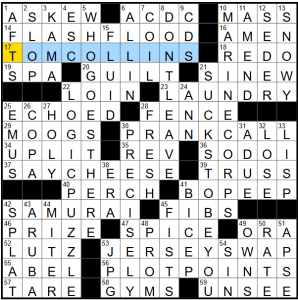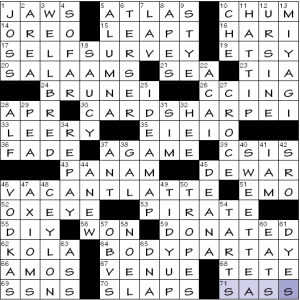Colin Adams’s New York Times crossword—Amy’s recap

NY Times crossword solution, 1/3/25 – no. 0103
Lots of good stuff to call out in this themeless. Fave fill: FLASH FLOOD, TOM COLLINS (my classic cocktail of choice), PRANK CALL, SAY CHEESE, sports JERSEY SWAP, PLOT POINTS, a fun LOGIC PUZZLE, “WHO GOES THERE?”, “SUCKS TO BE YOU,” and the MARINE CORPS.
Could do without bits like AFTS, SO DO I (duping REDO), TARE, APSE.
Two clues:
- 23a. [Heaps of dressing?], LAUNDRY. Absolutely I was picturing salad dressing.
- 13d. [White out, say], SNOWY. I was reading it as a verb phrase, whiting out an error, rather than the adjective in “it’s white outside” because it’s SNOWY. ‘Tis the season and all.
3.75 stars from me. How’d this one treat you?
Zachary David Levy’s Los Angeles Times crossword — pannonica’s write-up

LAT • 1/3/25 • Fri • Levy • solution • 20250103
Today we’re tagging on a long-a sound to the ends of phrases, adjusting spelling as necessary.
- 17a. [Therapist’s questionnaire?] SELF SURVEY (self-serve/serv).
- 30a. [Paper model of a wrinkly dog?] CARD SHAR-PEI (card sharp).
- 46a. [Empty cup at Starbucks?] VACANT LATTE (vacant lot). I believe some people pronounce latte with an open front unrounded vowel sound, as opposed to an open back unrounded vowel sound, in which case this entry would not work for them.
- 64a. [Celebration that involves rowdy games of Twister, facetiously?] BODY PARTAY.
Duly noted that each terminal syllable is spelled distinctly. And to draw a line under things, the central entry, 37-across, is [Peak performance, and an apt title for this puzzle] A-GAME.
- 3d [Brought up with excellent manners, say] WELL-BRED. 11d [Genteel gesture] HAT TIP.
- 34d [Fulfill a debt] REPAY. Not part of the theme.
- 15a [Bounded] LEAPT. I initially misinterpreted the clue, perhaps influenced by 2d [Floor plan measure[ AREA.
- 35a [Nursery refrain] E-I-E-I-O, comprised by some other long vowel sounds.
- 39a [Members of Gil Grissom’s team, briefly] CSIS. Awkward plural.
- 43a [Bygone airline whose first flight was from Key West to Havana] PAN-AM. Trivia I did not know.
Gary Larson and Amy Ensz’s Universal crossword, “Some Assembly Required”—Jim’s review
Theme answers were originally noun phrases but they’ve been re-imagined as verb phrases, and each adjective-turned-verb is a rough synonym of “create.”
- 17a. [Create a font?] FORM LETTERS.
- 30a. [Create work for a lawyer?] PRODUCE CASES.
- 49a. [Create dialogue?] FASHION LINES.
- 62a. [Create certain dresses?] SHAPE SHIFTS.
Good theme. I like the consistency with each theme answer working the same way, and the synonymous nature of the first words. PRODUCE CASES is certainly the weakest entry as it feels more green paintish than the others, but otherwise it’s solid.
The long fill is sparkly too with VISIGOTHS, PIANO BARS, LITE BEER, CLAM BAKE, a LATE BET, YANKEES, and BEGONIA. The center of the grid looks the most challenged with CROCI, SKOSH, and HANA being potential trouble spots for solvers, but it was mostly smooth sailing.
3.5 stars.

NYT: The clue for 12D was overly precise and arcane and wrong. Days of a Jewish calendar start in the evening before the day, and the correct date of the SEDER is 15 Nisan, not before 15 Nisan. This clue may have come about from a misreading of a Jewish calendar, where the date appears for the daytime and not the evening before, but it’s understood that the day begins at dusk the night before. Here’s Wikipedia: “The Passover begins on the 15th day of the month of Nisan, which at present falls between March 26 and April 25 of the Gregorian calendar. … The 15th day begins in the evening, after the 14th day, and the seder meal is eaten that evening.” Otherwise, I mostly enjoyed the puzzle.
NYT: I liked it and found it easy. Loved “IT SUCKS TO BE YOU”.
But AFTS? The way it was clued? Is this a common abbreviation that I missed?
That was also my one nit with this otherwise excellent puzzle. I suppose I’d prefer something like [FORES opposite] if it couldn’t be replaced. And what am I missing about PROM being a question on a poster?
My guess is that’s how Kids These Days (TM) are asking each other out to the prom? But that’s just my guess.
Fun and fast Friday overall.
Correct about PROM but it is usually more complicated that. You can’t just ‘ask a girl to prom’ anymore. There is usually some gimmick ranging from simple (a poster with a prom question on it in an appropriate setting) to renting an interstate billboard asking the question (absurd IMO).
ADUE new to me.
Fun puzzle!
a due can mean either ‘together’ or ‘separately’, depending on whether there are two musicians, or more than that.
Exactly so. I’ve taught high school for over 30 years. I’ve never seen a “promposal,” as they are now called, as simple and direct as writing “Prom?” on a poster.
NYT: I know it’s in common usage now, but I will never not be annoyed to see the incorrect singular BICEP.
NYT: I would have liked to see 41D BICEP clued as a variant, or informal, version of BICEPS.
(At onelook.com, only one U.S. dictionary among 5 or 6 includes this word.)
M-W doesn’t have an entry for bicep but but the biceps entry includes “or bicep,” which is good enough. It’s not even signaled as a variant. That’s the sound of a ship sailing.
None of the other U.S. dictionaries even mention bicep.
Since dictionaries now describe usage with no reference to correctness, the appearance of this word on mw.com counts for very little in my book.
They don’t even seem to have the concept of a spelling error.
And NYT crosswords rarely if ever refer to a variant, even when everyone would agree that an answer is indeed a variant.
Also, RHUD (where we’re talking a while ago) has a full entry for BICEP defined as “biceps muscle.” So that’s both standard dictionaries, surely enough for a crossword. It even sounds ok to my ear. So I agree that this ship is sailing. Is it really a distinction that enhances clarity or precision in ordinary speech so that it’s worth your fighting for?
M-W discusses further, at link below, refering to this simply as back-formation:
https://www.merriam-webster.com/grammar/biceps-plural-singular
Is there a more specific term for when a word gets, um, mis-singularized?
In terms of popular usage, ngram viewer seemed to show BICEP occurring roughly 30% as often as BICEPS circa 2022… (fwiw)
Pea (mistaken singular from pease) and cherry (mistaken singular from cherise) are in the same category, so there should be. I propose we call them cherries.
In any case, the proscriptive vs. prescriptive dictionary debate is irrelevant when talking about crosswords. Editors love the sparkle of current words and phrases. New coinages are not “misspellings,” but ways of keeping things interesting.
Exactamundo!
So incorrect plurals (or the opposite) are fine as long as they “keep things interesting?” I’m not sure I can agree. Octopus is a great example, since it’s a Greek word, with -podes being the correct/pedantic plural, and -puses being “just fine” but -pi being simply wrong, due to lack of knowledge about Greek vs Latin pluralization. Lots of people misuse there/their/they’re for similar reasons (as just one example), but no one (at least no one sane) would argue that it’s fine as fill as long as it keeps things fresh, no? (Asking honestly, as I’m not such a pedant as to insist that language never change, since that’s obviously dumb, with your two excellent examples above. Fun to learn that pea is the incorrect singularization of pease!)
Octopi sounds so much better than the alternatives. Some words that mix Greek and Latin roots include television, monolingual and automobile. So does amoral, which is apt to some. English is an equal-opportunity thief, and mongrels are a specialty.
My personal favorite Frankenword is “hypercorrect.”
Interesting. I do like the equal-opportunity thievery of English, but I just can’t agree with you on octopi, sorry. It is an ugly word, both to look at and to say. Octopodes (like antipodes) looks and sounds wonderful (IMO). Also interesting that all of the Greek/Latin mashups you gave are (invented) compound words, not incorrectly pluralized… Anyway, I’ll continue to be (mostly) open to “common usage” but will reserve the right to a a pedant about certain things (octopodes and “literal” meaning “figurative” are two that leap to mind) :)
Cuvier used octopi in 1834. People have been pedantic about it for almost two centuries!
NYT: Bit of déjà vu having ASKEW as 1-Across (same with Michael Lieberman’s Tuesday this week) and ESC being clued with it’s close proximity to the F1 key
Also, it’s interesting how PRANK CALL is getting it’s (NYT) debut here. I’d assume it’d come much sooner.
Speaking of 1-Across, below is fun trivia from NYT March 16, 2024 (22-Down)…
[Word that, when searched, causes Google to display all results at an angle]
“Why would anyone want a video of someone doing a crossword” idk but here you go: https://www.twitch.tv/videos/2348407941